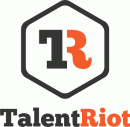[ibimage==25709==Medium==none==self==ibimage_align-center]
In its first year, the identity of a startup can still be relatively nebulous. A delicate balance of flexibility and focus must be found to mold the young business into its desired form. Even more care must be taken as a company grows while its identity is still coalescing. TalentRiot’s founder and CEO Fernando Cardenas successfully managed growth while maintaining a steady objective during its first year in 2013.
“Rewind six months, a year ago, we didn’t know who we were,” Cardenas said. “We were just a bunch of really hardworking, sharp folks who were looking to help businesses write software.”
When starting a business, you can’t precisely predict what your strengths as an organization will be. Cardenas explained, “You don’t necessarily know what’s going to work ahead of time because you’re not the market place.” Therein lies the crucial catch-22: you have to be in business to know what business you should be in.
Crossing this identity threshold throughout a venture’s first year is akin to hunting Moby Dick while still building the boat without knowing exactly where your white whale is. “You’re trying to keep the ship afloat while repairing the ship as you’re bailing water and trying to steer the ship, all at the same time,” Cardenas said.
To continue with the boat analogy, knowing who to bring on board from a startup’s inception is fundamental to staying above water during a venture’s inaugural year. Cardenas has shown an innate ability to recognize such talent. “It is just about finding great people. What are their skill sets, what are their strengths?” Cardenas said he concerns himself less with resumes and instead focuses on the soft skills that can make someone successful: “It’s important to look at people as individuals, not just on paper.”
Exhibit A is Director of Sales Russell Harris, who met Cardenas on the soccer field, of all places. Cardenas told Harris that he had great potential for a career in sales, which came as a bit of surprise to Harris; he hadn’t worked a day of sales in his life. Yet that was exactly what made him so good at it. Cardenas recognized in Harris the essential people skills, the relaxed demeanor and ability to empathize that would make him an invaluable asset to TalentRiot moving forward.
Today Harris is the face of TalentRiot to prospective clients. This philosophy of looking beyond tags has netted TalentRiot many a diamond in the rough; one of their most sought-after programmers never went to college, but can write software circles around many coders with degrees.
These hires have been what has made TalentRiot so successful: “It’s 5 percent us, 95 percent them. They are really sharp, qualified people looking for an opportunity… At the end of the day we want our clients to say, ‘That’s one of the best people we’ve ever worked with.’”
Over the last year, TalentRiot grew from one to 14 employees. Growth, while welcome, comes with its share of growing pains. Managing this growth has been one of Cardenas’s greatest successes at TalentRiot. “Looking at the last year, a lot of people use the analogy drinking from the fire hose.”
All the while Cardenas has been tinkering with the formula: “What lean startup is really all about is how can you run little experiments to figure out what’s going to work, what’s not going to work and have some structure around that process… until you find the recipe for success.”
Cardenas has taken advantage of the community in Colorado to help get this recipe right: “Here in Colorado, we have a very unique and supportive community… Rather than turn inward for advice for the next great idea, get out in the community and see what they’re doing. A lot of the great things that have happened to us have been because of our engagement with the community. The first thing I did when I wanted to take TalentRiot to the next level was I reached out to our competitors to see what they thought.”
Coming from a Boston background, Cardenas said this seems to be a sentiment unique to Colorado:“In Boston, it’s harder to get time with people. Here, it’s very open, very friendly. You can have lunch with your competitors. It’s definitely a great culture and place to do business in.”
Cardenas has embedded this culture in TalentRiot’s DNA: “That’s what TalentRiot is all about: finding really great people and helping everyone grow and get to the next level…It’s about building and making the tide rise for all ships.” This idea of mutual growth has been fundamental for Cardenas and Harris. “Helping businesses get to where they want to go helps us,” Cardenas said.
Fernando Cardenas and his TalentRiot team look forward to 2014. “Last year was about experimenting and seeing what worked. This year for us is about execution.” Cardenas and his crew of “business-minded software people” plan to focus their expansion in the energy and healthcare fields, all the while continuing to “iterate on what we did yesterday.”
